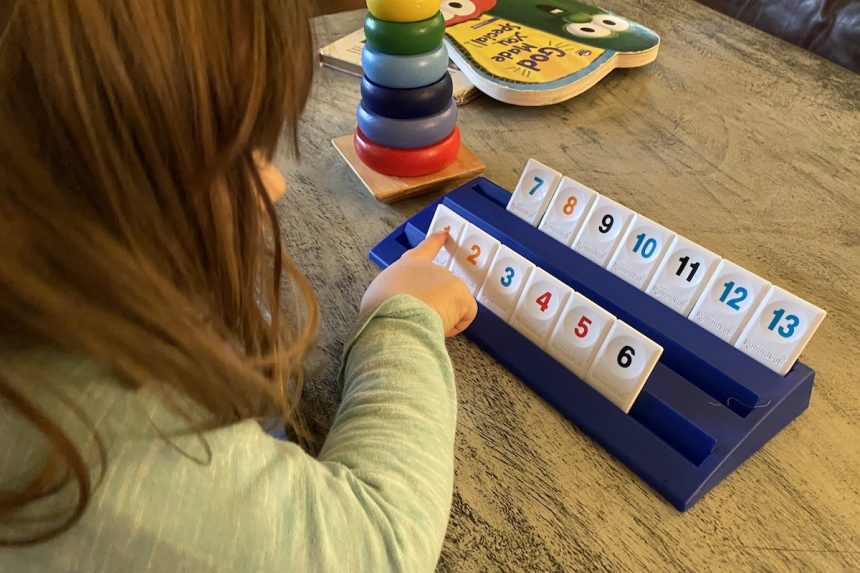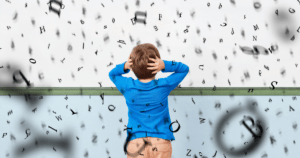In this world of STEM and now STEAM being focused on in education – math is just as important as it’s ever been. However, math is also something that is still stigmatized by much of the population. Let’s change this for our kids – let’s release of all the bad relationship baggage we may have from our personal educational experience with math and any our children may have experienced. Let’s detox, re-define and destigmatize math for our kids, and in doing so – for ourselves!
Math. If you’re cringing now, keep reading!
Math. What is it? Math is a language.
Just like English or Spanish or any spoken/written language, math is a language that uses numbers and symbols instead of letters. Music is a language too, but that’s for another day….or wait, it’s for another day after I say one more thing….
Music is a language AND it’s also a mathematical language! The rhythm and melody involve the same regions of your brain that process numeracy and phonetic literacy. While I’m on a bunny trail, let me dive down the rabbit hole a bit more and say that grammar (aka language construction) is a mathematical process too. The brain, in all three of these seemingly separate skills, uses the same neural system to discern symbols and their organization into a way to communicate.
90-Minute School Day Tweet
Let’s destigmatize math. Instead of viewing it as a negative necessity, let’s reframe it with our kids. Here are some alternate ways to describe and think about math. Some new math facts, if you will.
Math is a puzzle. There are many different strategies to complete and solve the puzzle, but only one correct outcome – the completed puzzle. Who doesn’t like puzzles?
Math is a game. You can employ different strategies to get to a correct solution.
Math is a mystery. It takes some detective work to solve it.
Math is a skill. Like riding a bike, it is something that takes practice and builds over time…but once you unlock it, you have it forever.
Just as literacy is key in reading, numeracy is key in math.
Let’s focus on our kids’ numeracy as much as we focus on their reading. This is not permission to get dictatorial here, but rather an invitation to find ways to connect with your kids in math just as you can in reading.
Reading is fairly simple and intuitive to promote, read aloud. Study after study after study says to read aloud to your kids beginning at birth (even in utero) and continue until they leave home. Yes, until they leave home – not when they learn to read independently (which is when reading aloud to kids typically levels off and declines).
Math connections can be aloud as well. Math aloud, people!
This can happen all day by simply completing math out loud. Count the stairs by 1’s or by 2’s or 3’s…as you go up and down them. Count cars or signs when driving, ask questions with simple math when running errands, use rounding and estimation. This is numeracy. Just as you built your kids’ vocabulary with words by talking to them and reading to them, talk and play with numbers.
Play games. Buy a deck of cards – there are so many card games that can be played to promote numeracy. For preschoolers, cards provide the numbers and also the visualization in suit symbols associated with that number. Use these as flash cards, have them touch the suit symbols and count. Place two cards face up and ask the children to add or subtract or multiply and divide, make it a race. Play actual card games with older kids. Gin Rummy is a great one, so is Cribbage, there are so many. Roll some dice, play dominoes, pick-up sticks, hopscotch, Sudoku, Bingo, tic-tac-toe, checkers, matching games like Uno and Memory or work a puzzle, the list is as infinite as numbers themselves, almost.
Read about math. Here are just a few of many great math books to whet the math appetites in your home.
- Life of Fred Mathematics Series
- Bedtime Math Series – Laura Overdeck
- At the Same Moment Around the World – Clotilde Perrin
- Fractions in Disguise – Edwards Einhorn
- Fun with Roman Numerals – David A. Adler
- How Much is a Million? – David M. Schwartz
- The Lion’s Share – Matthew McElligott
- Millions of Cats – Wanda Gag
- One Grain of Rice: A Mathematical Folk Tale – DEMI
- Tangram – Joost Elffers and Michael Schuyt
- Zero the Hero! – Joan Holub
Mathematical play. Make it a goal to increase numeracy in your home by playing a game a week perhaps. Swap out a math assignment for it. Sing songs with numbers (99 Bottles, Ants Go Marching, etc). Resolve to do math aloud. Include kids in cooking and baking, this is everyday math. Ask math questions as part of your narration work. Skip count with your kids several times a week, if not every day. Decide to skip count going up and down stairs as a new habit.
Find workable ways to increase numeracy in your home and look at math as a friend, a fun puzzle or game, an opportunity to work on team building skills and collaboration with your kids as you solve problems together. Let’s de-stigmatize math and embrace it as the skill it is to enhance living.




